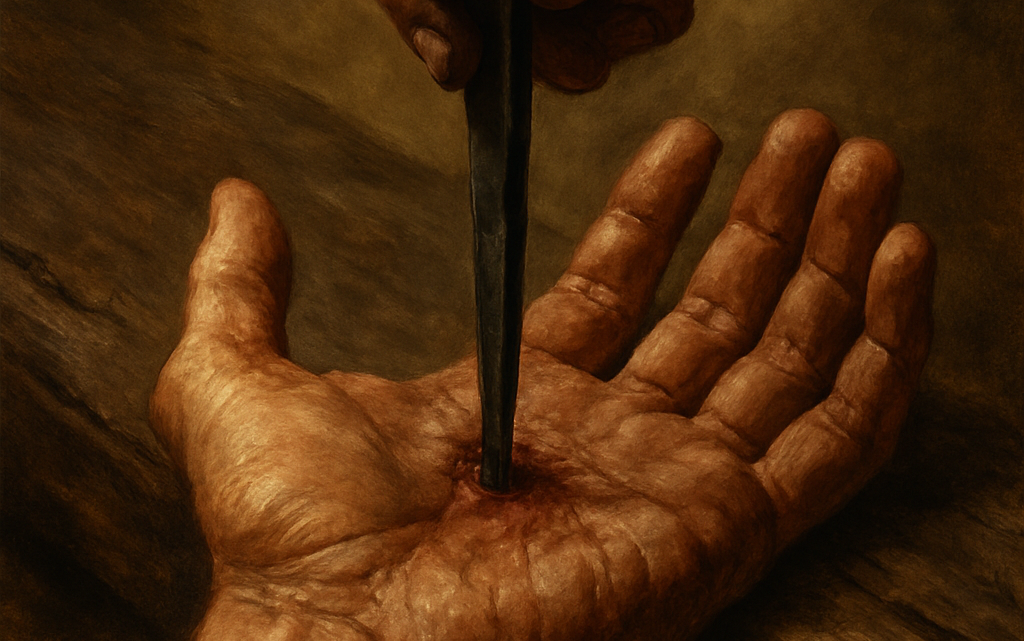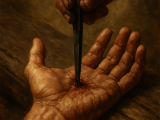“The Wounded King: Seeing Yeshua in Isaiah 53”

Introduction
Long before Bethlehem’s star lit the sky, long before the cross cast its shadow on the hill of Golgotha, the prophet Isaiah saw Him.
Wounded. Rejected. Silent before His accusers.
This was not the conquering Messiah that many expected. This was the Lamb. And Isaiah saw Him centuries before He arrived — not in a manger, but in the full weight of His mission: to suffer, to be pierced, and to carry the sins of His people.
Isaiah 53 is not just a prophecy. It’s a mirror. It shows us the cost of our sin, the depth of Yehovah’s mercy, and the unimaginable love of the King who came to restore His Kingdom.
Let’s walk through it, verse by verse — with open hearts.
“Who has believed our report?” (Isaiah 53:1)
Even today, the message of a suffering Messiah is hard to believe. The idea that the King of Glory would willingly humble Himself, take on flesh, and allow Himself to be crushed?
But that is the report Isaiah gave — and only those with spiritual eyes can truly see it.
“And to whom is the arm of Yehovah revealed?”
The “arm of Yehovah” is His power to save — and here, it’s personified in Yeshua. Not in military might, but in sacrificial love.
“He grew up before Him like a tender shoot, and like a root out of dry ground…” (v.2)
Yeshua’s birth was humble. A carpenter’s son. Born in occupied territory. No crown, no royal procession — just a root in dry soil.
“He had no beauty or majesty to attract us to Him, nothing in His appearance that we should desire Him.”
The world loves power, glamour, and charisma. But Yeshua’s power was hidden — in obedience, in truth, in meekness.
“He was despised and rejected by men…” (v.3)
He knew betrayal. He knew abandonment. He was misunderstood by the religious, hunted by the powerful, and ultimately rejected by the very people He came to save.
“A man of sorrows, acquainted with grief.”
He didn’t just carry pain — He knew it. He entered into the human experience fully. The grief, the loneliness, the temptation — and yet without sin.
“Surely He took up our pain and bore our suffering…” (v.4)
The word surely is emphatic in Hebrew — it’s like saying, “Make no mistake.” He didn’t just witness our suffering; He carried it.
“Yet we considered Him punished by God, stricken by Him, and afflicted.”
Many looked at His suffering and assumed He was cursed. But Isaiah pulls back the curtain and reveals the truth:
“But He was pierced for our transgressions…” (v.5)
This is the heart of the Gospel.
“Crushed for our iniquities; the punishment that brought us peace was on Him, and by His wounds we are healed.”
The Hebrew word for “pierced” (chalal) implies a violent piercing — a prophetic image of the crucifixion. And “crushed” (daka) carries the sense of being broken into pieces.
He took the blows — so we could be made whole.
“All we like sheep have gone astray…” (v.6)
This is the great reversal. We sinned. We wandered. But the punishment fell on Him.
“Yehovah has laid on Him the iniquity of us all.”
This wasn’t divine child abuse — this was covenant fulfillment. The Lamb was willingly offered, and Yehovah accepted the offering for the sake of many.
“He was oppressed and afflicted, yet He did not open His mouth…” (v.7)
Like a lamb to the slaughter. Silent. Submissive.
Yeshua didn’t defend Himself. He didn’t retaliate. He fulfilled prophecy — down to His silence.
“By oppression and judgment He was taken away…” (v.8)
Yeshua’s trial was illegal. His execution unjust. But Isaiah foretold it all.
“For the transgression of My people He was stricken.”
He stood in our place. As the substitute. The scapegoat.
“He was assigned a grave with the wicked, and with the rich in His death…” (v.9)
Crucified between criminals. Buried in a rich man’s tomb.
Every detail — precise. Every word — fulfilled.
“Though He had done no violence, nor was any deceit in His mouth.”
Even Pilate said, “I find no fault in Him.” And yet He bore the penalty — willingly.
“Yet it pleased Yehovah to bruise Him…” (v.10)
This is a hard verse — until we understand covenant. The Father was not pleased in suffering, but in the outcome of the suffering. A restored people. A redeemed bride.
“He will see His offspring and prolong His days, and the will of Yehovah will prosper in His hand.”
His death was not the end — it was the door to resurrection and victory.
“After the suffering of His soul, He will see the light of life…” (v.11)
The resurrection — hidden here in Isaiah.
“By His knowledge My righteous servant will justify many, and He will bear their iniquities.”
Yeshua did what no priest or prophet could do. He didn’t just teach righteousness — He became our righteousness.
“Therefore I will give Him a portion among the great…” (v.12)
The Lamb becomes the Lion. The Suffering Servant becomes the Reigning King.
“Because He poured out His soul unto death… and made intercession for the transgressors.”
Even in death, He prayed for us. “Father, forgive them…”
Conclusion: Do You See Him?
Isaiah 53 is not just a chapter — it’s a confrontation.
It demands a response.
You can’t read it and remain neutral. Either this was a man misunderstood… or it was the Messiah, the Promised One, the King who laid down His life.
Yeshua fulfilled it all.
Not to cancel the covenant… but to seal it with His own blood.
“Behold the Lamb of God, who takes away the sin of the world.”
— John 1:29
May we never become so familiar with this passage that we forget the weight it carries — and the love it reveals.










